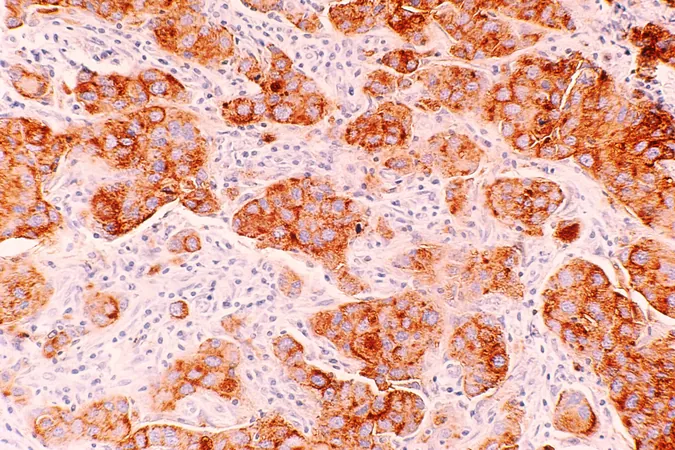
Cancer Cells Find Sneaky Way to Outsmart Our Immune System
2025-07-17
Author: Wei
A groundbreaking study from the Ludwig Cancer Research team reveals a clever tactic used by cancer cells to undermine anti-tumor immunity. This intricate web of molecular interactions allows cancer cells to manipulate surrounding non-cancerous cells, enhancing their own growth and survival.
Researchers led by Ping-Chih Ho, Xiaoyun Li, and Sofie Hedlund Møller have discovered that fat molecules secreted by cancer cells prompt fibroblasts, the body's structural cells often exploited by tumors, to increase their production of glutamine, an important amino acid.
Published in the Journal of Experimental Medicine, the study highlights how this amino acid transforms immune cells, known as macrophages, into allies of cancer cell proliferation, effectively silencing the body’s anti-tumor defenses.
Ho states, "Our findings offer new insights into the complexity of the tumor microenvironment and illustrate a previously unknown mechanism by which cancer cells sculpt their metabolic environment to serve multiple needs." This revelation suggests new strategies for reprogramming the tumor microenvironment, potentially enhancing immunotherapy effectiveness.
The role of seemingly mundane cells, like fibroblasts, in tumor biology has gained significant attention. These cancer-associated fibroblasts (CAFs) can alter immune responses, enabling tumors to thrive by secreting factors necessary for cancer cell metabolism and growth.
Recent investigations revealed glutamine levels soaring in melanoma tumors, prompting researchers to examine its effects on tumor-associated macrophages (TAMs). They found that glutamine synthetase, an enzyme critical for glutamine production, was expressed abundantly in CAFs within these tumors.
The team discovered that palmitic acid, a fat similar to palm oil produced by melanoma cells, activates receptors on CAFs, prompting them to ramp up inflammatory gene expression. Among these, interleukin-6 (IL-6) boosts glutamine levels in the tumor microenvironment, pushing TAMs into a state that fosters tumor growth and dampens immunity.
Møller emphasized, "Our findings reveal a new way that cancer hijacks surrounding cells to protect itself and grow." Given glutamine's growing reputation as a target for cancer treatment, this research suggests that disrupting glutamine production in fibroblasts could enhance therapeutic outcomes.
The researchers mapped the biochemical signaling pathways in CAFs leading to inflammation and identified ways to reverse their impact by knocking out the gene for glutamine synthetase. This intervention reprograms TAMs to restore anti-tumor immunity, leading to slower tumor growth in mouse models.
Significantly, the study also showed that CAFs linked to glutamine synthesis genes are closely associated with pro-tumor TAMs in genomic datasets from breast cancer patients, further solidifying the connection between metabolic processes and cancer progression.

 Brasil (PT)
Brasil (PT)
 Canada (EN)
Canada (EN)
 Chile (ES)
Chile (ES)
 Česko (CS)
Česko (CS)
 대한민국 (KO)
대한민국 (KO)
 España (ES)
España (ES)
 France (FR)
France (FR)
 Hong Kong (EN)
Hong Kong (EN)
 Italia (IT)
Italia (IT)
 日本 (JA)
日本 (JA)
 Magyarország (HU)
Magyarország (HU)
 Norge (NO)
Norge (NO)
 Polska (PL)
Polska (PL)
 Schweiz (DE)
Schweiz (DE)
 Singapore (EN)
Singapore (EN)
 Sverige (SV)
Sverige (SV)
 Suomi (FI)
Suomi (FI)
 Türkiye (TR)
Türkiye (TR)
 الإمارات العربية المتحدة (AR)
الإمارات العربية المتحدة (AR)